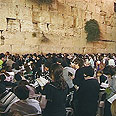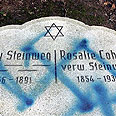Second biggest synagogue in Budapest
כ׳ בְּאָב תשע״א
20th of Av, 5771
Sat, 20 August 2011
While the current market is in a state of turmoil, this week's Torah portion offers a look into Judaism's original economic philosophy: that all wealth originates with God. We can translate the concept of the divine ownership of wealth into recognition of the collective effort involved in the generation of wealth.
The key teaching of this week's Torah portion, Ekev, is that all wealth originates with God. "When you have eaten your fill," Moses warns the people, on the edge of the Promised Land, "and have built fine houses to live in, and your herds and flocks have multiplied . . . beware lest your heart grow haughty and . . . you say to yourselves, 'My own power and the might of my own hand have won this wealth for me.'. . . Remember that it is the Lord your God who gives you the power to get wealth . . ." (Deuteronomy 8: 12-18). MORE>
By Talia Davis
The parsha (weekly Torah portion) for the week ending July 31 is Ekev. Ekev means "if [you follow]" and it is the second word (and first distinctive word) in the portion. Be sure to check out the video at the end of this article!
Parshat Ekev is sort of a continuation of the previous parshat, Va'etchanan. In fact, the whole book of Devarim (Deuteronomy) so far has been one big long lecture by Moses to the people of Israel. It's kind of like your grandpa when he keeps lecturing you about the ‘old days' and telling you about your family. The Israelites are like young children who are bored by his long lecture.
We can translate the concept of the divine ownership of wealth
into recognition of the collective effort involved in the generation
of wealth.
into recognition of the collective effort involved in the generation
of wealth.
The key teaching of this week's Torah portion, Ekev, is that all wealth originates with God. "When you have eaten your fill," Moses warns the people, on the edge of the Promised Land, "and have built fine houses to live in, and your herds and flocks have multiplied . . . beware lest your heart grow haughty and . . . you say to yourselves, 'My own power and the might of my own hand have won this wealth for me.'. . . Remember that it is the Lord your God who gives you the power to get wealth . . ." (Deuteronomy 8: 12-18).
This teaching provides the theological foundation for Judaism's economic philosophy. According to Rabbi Meir Tamari, director of the Centre for Business Ethics in Jerusalem, the concept of the divine ownership of wealth "is the only reliable means whereby greed is able to be channeled into morality" (The Challenge of Wealth, 1995). Rabbi Jacob Neusner similarly affirms that the concept that "God owns the land and that the household holds the land in joint tenancy with God" accounts for the "mixed economics--market [and] distributive," of Judaism (The Economics of the Mishnah, 1990).
Harav KOOK
institute
on weekly parashah
PARASHAT
Ekev
The Haftarah selection is from Isaiah, 49:14-51:3.
"God has forsaken me," Zion sighs, "my Sovereign has forgotten me" (49:14). This lament opens the second of seven haftarot of consolation, marking the seven weeks (and seven Shabbatot ) between Tisha B'Av and Rosh Hashanah. Though the first verse offers little consolation, the rest of the haftarah responds to this sad statement with positive, hopeful promises of the future redemption.



JEWISH WORLD NEWS
IAI ( Israel Aerospace Industries Ltd. ) at Paris Airshow 2011
August 19th 2011 Israel Aerospace Industries is globally recognized as a leader in
developing military and commercial aerospace technology.
Deadly attack in Israel
























No comments:
Post a Comment